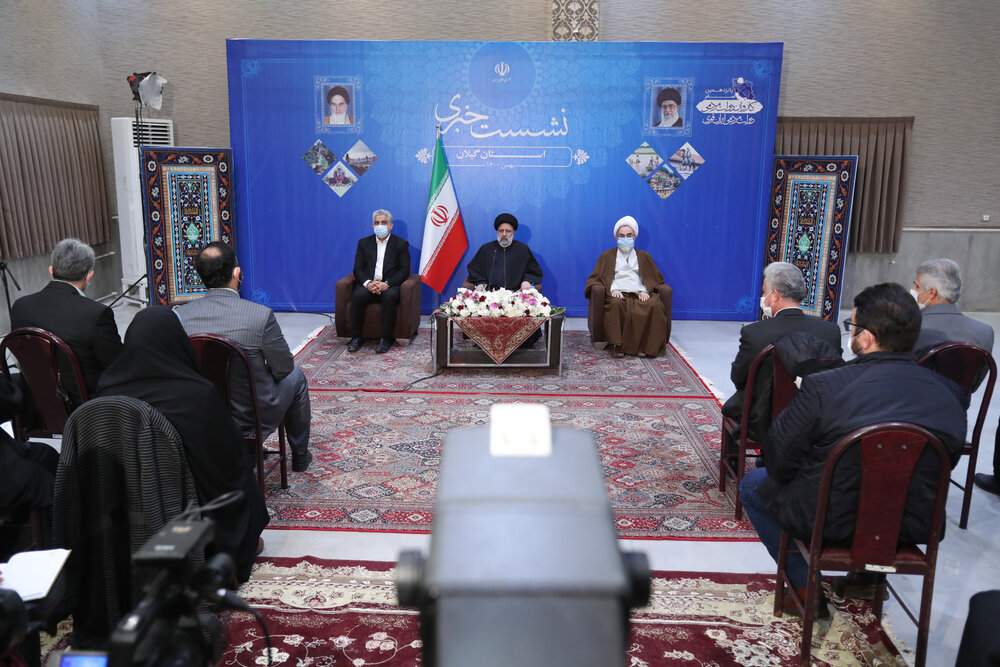Raisi wraps up visit to Gilan

TEHRAN – President Seyed Ebrahim Raisi wrapped up a visit to the Caspian Sea province of Gilan on Friday night.
Ever since taking over as president last August, Ayatollah Raisi has been paying weekend visits to Iran’s provinces. His visit to Gilan marked his 15th provincial trip.
He arrived at Sardar Jangal International Airport in Rasht on Friday morning and was welcomed by the representative of the Supreme Leader in the province, the governor-general, and local officials.
Speaking on Friday upon arrival in Gilan province, Ayatollah Raisi told reporters about the objectives of the trip. "Gilan province has many capacities in the field of maritime economy, tourism and industry, which can be activated to address the problems and concerns of the people of the province, and especially eliminate unemployment.”
The president noted, "Before this provincial trip, the needs and problems of the province have been examined and proposals for solving the problems have been prepared, which will be approved in the meeting of the administrative council of the province after discussions."
He added, “I hope that the serious measures that have been started for the development and prosperity of Gilan province will lead to solving the problems and improving the status of the province in various fields.”
During his visit, the president visited Iran Pooshesh Industries Company immediately after entering the province. He toured different parts of the industrial complex.
He also paid a visit to the Caspian Port Maritime Traffic Control Center and the construction site of the Qazvin-Rasht-Anzali railway project.
He examined the situation of the Goharrood River in the center of Rasht in person. During the visit, the head of the Department of Environment and the officials of Rasht Municipality presented a report on the reasons for the pollution of this river and the environmental damage caused by it, according to the official website of the presidency.
The president also visited the tomb of Mirza Kuchak Khan Jangali and commemorated his bravery against domestic tyranny and foreign colonialism. "The bravery of figures like Mirza Kuchak Khan Jangali should be introduced to the youth and the future generations," he suggested.
During the provincial tour, Raisi also held a meeting with elites, clerics, families of martyrs, veterans, and representatives of various groups of the people in the province.
At the meeting, Raisi considered the aging of the population as one of the problems of Gilan province and stated, "There are many solutions to overcome this problem."
The president pointed out, "Solving the problems of the people and strengthening the spirit of hope is the duty of the government and all those who serve in the name of the Islamic system."
Ayatollah Raisi also visited the Presidential Public Relations Centre in Rasht on Friday evening and stressed the need to respond accurately and quickly to the demands of the people.
The president held a meeting of the Administrative Council of Gilan Province.
At the end of the trip, Ayatollah Raisi held a press conference during which he said, “The president feels a duty and responsibility towards the people, and we seek to address the concerns and problems of all people."
Referring to the God-given capacities and gifts of Gilan province, the president said, "Gilan enjoys the advantages of forests, sea, fertile soil, pleasant weather, as well as great dignitaries, scholars and commanders, and these capacities, can be a great support for the growth and excellence of this province".
Raisi added, "Protection of forest, coast, and land is an inevitable necessity and any misuse of these blessings must be countered."
The president also said, "Due to its geographical location, Gilan province can be the hub of the country in trade and economic exchanges with the northern neighbors."
Elsewhere in his remarks, Ayatollah Raisi said, "In using beaches, the law stipulates that no administrative or governmental body has the right to prevent people from exercising their rights.”
"The administrative apparatus should consider itself more obliged than others to observe the rules and rights of the people."
Leave a Comment